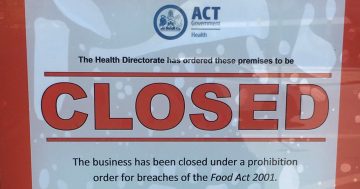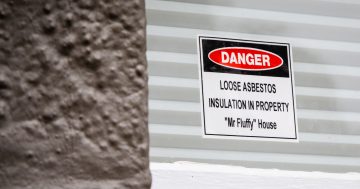
Canberrans warned to throw rockmelon away following a serious listeriosis outbreak.
ACT residents have been warned to throw out any rockmelon in their fridges following an outbreak of listeriosis caused by eating contaminated rockmelon which has led to two deaths in NSW.
ACT Chief Health Officer Paul Kelly today said it is possible that contaminated rockmelon is still being kept in the fridges of some Canberra homes and has warned people who are at high risk of listeria infection to avoid eating rockmelon at all.
To date, 10 cases of listeriosis have been reported in elderly people in NSW, Victoria and Queensland, with each person reporting that they ate rockmelon before becoming sick.
According to the Food Safety Information Council, the outbreak has been linked to a farm based in Nericon, near Griffith in south-west NSW.
ACT Health said there have been no cases reported in the ACT so far this year and the affected product has been removed from the supply chain, with the company voluntarily ceasing production.
However, the investigation is ongoing and the rockmelons could have been purchased at any time between late last year and “recent days”.
“It is possible that people would still have this rockmelon at home in the ACT,” Dr Kelly told ABC Radio this morning.
“The key message today is that people who do have rockmelon in their fridge should be discarding that now.
“People who are most vulnerable shouldn’t be eating rockmelon at all.”
Dr Kelly said that all the people affected to date have been elderly.
According to ACT Health, those considered to be at high risk for listeriosis include:
- pregnant women;
- elderly people;
- people with underlying health conditions, such as cancer, diabetes, kidney disease, liver disease and HIV.
Listeriosis is seen as a serious illness and is caused by bacteria called Listeria, with infection usually caused by eating contaminated foods. The bacteria can be present in raw foods or foods may become contaminated after processing or cooking.
A spokesperson for the Food Safety Information Council, Lydia Buchtmann, said that Listeria is found widely in the environment and rarely causes serious illness in the general population.
However, she said that for vulnerable people, such as those who are over 70, pregnant, or have diabetes, cancer or suppressed immune systems, it can be extremely serious or even life-threatening.
Dr Kelly said the incubation period can be quite long – even up to six weeks.
Symptoms include fever, headaches, tiredness, muscle aches and sometimes gastrointestinal issues.
People are advised to contact their doctor as soon as possible if symptoms appear.
Acting Dean in the School of Science at Swinburne University of Technology, Professor Enzo Palombo, said that Listeria is found through the environment – in soil and water – and is able to contaminate foods during any stage of production.
“The current incident has been linked to bacteria found on the skin, not the flesh, of rockmelons,” Professor Palombo said.
“However, the risk is that the bacteria can be transferred to the flesh during preparation – cutting and slicing.
“Storing whole or cut fruit in the fridge does not eliminate the risk as Listeria bacteria survive and grow at low temperatures.
“The advice from the health authorities is to discard any fruit – whole or cut.”














